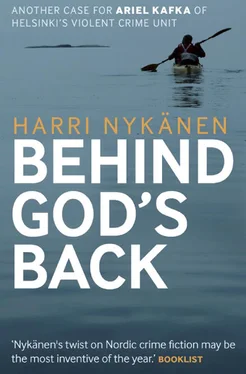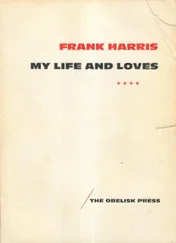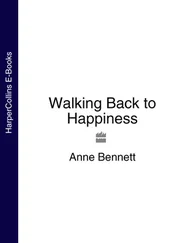Silberstein glanced at me with his usual coolness, and I felt like a corporate spy from Apple in the holiest of Microsoft holies. The room as was drab as every other one in the building. Silberstein was no visual maverick. He probably wasn’t a maverick in any sense of the word. The bookshelf held company publications, patent legislation and a few other deadly boring yet appropriate volumes. A couple of corporate pennants stood on the windowsill, and a large photograph hung from the wall. It showed Silberstein shaking hands with a guy with a moustache. I took a closer look and realized it was Olympic swimmer Mark Spitz, who had won seven gold medals for the US in Munich. Spitz was Jewish.
“Was that taken in Finland?” I asked, genuinely curious.
“No, Jerusalem. Would you mind getting to the point?”
The fact that Silberstein didn’t even try to impress me by telling me more about his meeting with Spitz revealed the caste to which he relegated me.
I replied equally brusquely. “I’d be happy to. To begin with, could you tell me what duties Max Oxbaum had in the congregation?”
“What do you mean… what duties?”
“He was on the executive committee. Did he have some particular area of responsibility?”
“Yes. Security.” I didn’t laugh, even though I found this amusing. Max’s role in the congregation wasn’t news to me, but it offered a good entrée to the real matter at hand. “He took over when your brother quit.”
“What did that mean in practice?”
“He represented the congregation and worked with the security company, the police and the security detail from the Israeli embassy as necessary, considering the risks represented by various events.”
“Jacobson and Max were both on the executive committee, and now both of them are dead. Has that occurred to you?”
“At least not from the perspective you’re getting at.”
“And what perspective would that be?”
“Isn’t it obvious? That their position in the congregation would have been the cause of their deaths.”
“Why couldn’t it have been?”
Silberstein’s response was a dispassionate stare tinged with a pinch of condescension.
“Did Max have anything out of the ordinary going on right before his death?”
“What do you mean by out of the ordinary?”
“Did the congregation have any risk-sensitive events coming up where Max would have been involved in the arrangements?”
Silberstein hesitated for a second. When he continued, I knew he was lying, or at least soft-pedalling.
“No, nothing out of the ordinary.”
“Hmm. That’s strange. I heard that Haim Levi, the new Israeli Minister of Justice, would be visiting the synagogue during his trip to Finland. Has the visit been cancelled?”
This time Silberstein thought for at least three seconds. “There has been some correspondence about the matter, but —”
“But what?”
“He has preliminarily promised to attend, but —”
“Don’t you find the visit worth mentioning?”
Silberstein pouted.
“Did Max have anything to do with the visit?”
“He had been in touch with the ministry, but —”
“I don’t want to hear any more buts, just the facts.”
Even Silberstein leant back when I raised my voice. I was a criminal investigator, after all, and had all of the authority bestowed by my office behind me.
“I can hear perfectly well without you shouting,” Silberstein said, his voice dripping indignation.
“You’re sabotaging the investigation by holding back critical information.”
Silberstein’s face darkened storm-black. Before long, lightning would strike. “Now you’re going too far. You can be sure that I’ll speak to your superior about this. You’ve underestimated me badly. The chief of staff at the Ministry of Justice is a good friend of mine —”
“Why don’t you just talk to me instead? Max was in charge of arranging the minister’s visit, and you didn’t say anything about it. You also didn’t say anything about Samuel Jacobson being involved in the arrangements, and to top it all off, that he knew minister Levi. We’re trying to come up with a motive for Jacobson and Max’s deaths, but you’re holding back information. Why?”
Silberstein struggled with his outrage for a moment and then said, in a surprisingly compliant tone: “There’s no proof that the murders are related to the visit. The last thing I want to do is spread rumours that would hurt the congregation.”
“They are related, and you know it full well. Were you afraid the visit would be cancelled if there was some remote chance that risks were involved? That the congregation, or you, would forfeit an amazing PR opportunity, and you’d lose out on a new photo op that would look great hanging there next to Spitz?”
“What have I ever done to you? You’re intentionally trying to offend me. The Israeli Ministry of Justice is aware of what has happened. We were also informed in no uncertain terms that the unfortunate incidents that have taken place here will have no effect on Levi’s visit.”
“Not even the agenda?”
“We haven’t been informed of anything of the sort, at least.”
“Jacobson knew Levi personally. Levi lived at his home during his year as an exchange student. Isn’t that true?”
“So I was told.”
“Was Levi supposed to visit Jacobson at his house?”
“No, at…”
“At?”
“At his cottage. Levi had such fond memories of the place when he lived in Finland that he wanted to visit there again, to go for a sauna and a swim.”
“What about now that Jacobson is dead? You just told me that there weren’t going to be any changes to the agenda.”
Silberstein stared out of the window. A busy arterial ran past, and more dreary grey element-construction buildings stood on the other side of it.
“Samuel’s son Roni has promised to act as host during the visit to the cottage.”
“At Emäsalo?”
It wasn’t really a cottage, but an old farmhouse on the sea. The sauna was right at the waterline. I had been there with Lea once. After bathing in the sauna, we had skinny-dipped under the August moon.
“And are you participating in this jaunt to the cottage?”
“That was the plan.”
“Who else is going?”
“Of the trustees, myself, Josef Mayer and Jari Kantor; and then Roni, of course, and his friend Dani Pasterstein, who also knew Levi; Joel Stern, and your brother Eli.”
I felt a twinge in the pit of my stomach.
“Why is Eli going?”
“He returned to Max’s place on the executive board. He’s taking over Max’s duties during the visit.”
If Eli had been a little tipsy the last time we met, this time he was dead drunk. And he didn’t even try to hide it. When he tossed soil onto Max’s coffin, I was afraid he would fall into the grave. I could see the tears stream down his cheeks, even though he clumsily tried to wipe them away.
“ Barukh atah Adonai Eloheinu melekh ha’olam ,” Eli mumbled in Hebrew. It meant: Blessed are you, Lord, our God, sovereign of the universe . After that, he tore so violently at the collar of his shirt that his top button flew into the grave. Rending one’s clothes was part of the Jewish burial tradition, but Eli’s interpretation was in a class of its own.
He had started drinking before Max’s funeral, and started right back up after the ceremony, out of a pocket flask. Some of the attendees eyed him in amusement, my uncle Dennis in concern and Silberstein in disapproval. Silberstein’s expression augured a short career for Eli in the governing bodies of the Helsinki Jewish congregation. This time, none of the glares had any effect on Eli. He could be thick-skinned, especially when drunk.
Читать дальше












